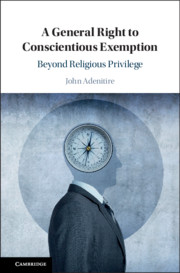
-
Select format
-
- Publisher:
- Cambridge University Press
- Publication date:
- July 2020
- July 2020
- ISBN:
- 9781108777780
- 9781108478458
- 9781108745826
- Dimensions:
- (228 x 152 mm)
- Weight & Pages:
- 0.64kg, 336 Pages
- Dimensions:
- (229 x 152 mm)
- Weight & Pages:
- 0.25kg, 336 Pages
- Subjects:
- Law, Religion, Religion: General Interest, Jurisprudence
You may already have access via personal or institutional login- Subjects:
- Law, Religion, Religion: General Interest, Jurisprudence
Book description
The book argues that there is in the US, Canada and UK, a general right to conscientious exemption available to a person who objects to any legal obligation whatsoever on the basis of a religious or non-religious conscientious belief. The book provides a liberal defence of this right and argues that it should be considered a defining feature of a liberal democracy. A general right to conscientious exemption is a legal right to conscientiously object to any obligation imposed by law and to receive from a court an exemption from complying with such obligation. The general right defended in the book is not an absolute right. A court may refuse to grant an exemption if doing so would disproportionately impact the rights of others or the public interest. The book suggests how the general right should be balanced against important rights, such as non-discrimination on the basis of sexual orientation.
Reviews
'At a time when the highest courts in Canada, the United Kingdom, and the United States are all wrestling with the difficult contours of conscience rights, this book provides an invaluable panoramic view of the doctrinal landscape in each jurisdiction, along with a bold and incisive normative claim about the importance of extending exemption rights beyond religion in the modern liberal state.'
Jim Oleske - Professor, Lewis and Clark Law School, Oregon
'In his important new book Adenitire shows that liberal democracies such as the UK, the US, and Canada have recognized a general but limited right of conscientious objection. He makes a strong case that this right to be exempted from ordinary law stems from the state’s duty of neutral pluralism and is an essential characteristic of any liberal democratic society.'
Richard Moon - Distinguished University Professor and Professor of Law, University of Windsor, Ontario
'Dr Adenitire’s path-breaking and thought-provoking book provides the most methodologically rigorous defence of normative and interpretative claims to a qualified right to exemption from any legal obligation on conscientious grounds, not limited to religious matters, under the laws of liberal societies, including the current law of the USA, Canada, the ECHR and the UK. Its challenge to received opinion should be read by policy-makers, lawyers and political theorists.'
David Feldman - Emeritus Rouse Ball Professor of English Law, Faculty of Law, University of Cambridge, and Emeritus Fellow, Downing College, Cambridge
Contents
Metrics
Altmetric attention score
Full text views
Full text views help Loading metrics...
Loading metrics...
* Views captured on Cambridge Core between #date#. This data will be updated every 24 hours.
Usage data cannot currently be displayed.
Accessibility standard: Unknown
Why this information is here
This section outlines the accessibility features of this content - including support for screen readers, full keyboard navigation and high-contrast display options. This may not be relevant for you.
Accessibility Information
Accessibility compliance for the PDF of this book is currently unknown and may be updated in the future.


